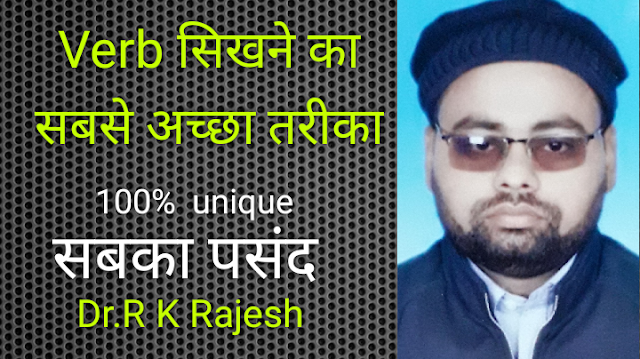Verb (Parts of Speech)
Verb
It is a word which comes to denote an action, a state or a possession in a sentence.
Or, An action denoting word,is called Verb.
Or, A word that comes to do something.
As:- eat ,plant, play, go,come etc.
Mostly, it has been separated into two parts;
1.Main Verb
2. Helping Verb
Main Verb:
It is a word that comes to denote only an action in a sentence.
Or, An action denoting word, is called Main Verb.
As:- Raman eats an apple.
Sudha goes to London.
Now, Main Verb is also divided into two groups;
1.Transitive:It is also a kind of action which needs an action to clear its meaning.
As: You know it.
Sudha plays cricket.
2.Intransitive:- It is also a kind of action that does not need an object to clear its meaning.
As:You sleep.
She swims.
He is running.
She walks.
Helping Verb:-
It is a word that comes to denote a state or a possession in a sentence.
As:- Raman is waiting for you.
He is playing football.
You have a car.
He is a student.
It has also two groups:-
1.Primary Verb:
It is used from beginning in a sentence into three forms.
A.To be- 08
B.To Do: 03
C. To Have: 04
To Be:(is,am,are, was, were, be,being, been)
To Do:(do,did, does)
To Have:(have, has, had,having)
2.Modals
Modals
It is a branch of Helping Verb. There are 13 modals:-
1.Can
2.Could
3.May
4.Might
5.Shall
6.Should
7.Will
8.Would
9.Need
10.Dare
11.Ought to
12.Used to
13.Must
Use of Modals
1.Can : It is used in the sense of present capacity, ability, capability and competence in a sentence.
As:- She can go to Patna.
Ram can qualify in this examination.
2.Could:- It is used in the sense of past capacity, capability, ability and competence in a sentence.
As:- Raman could not qualify in the state level examination .
Sudha could not control the situation in her society.
3.May:- It is used in the sense of probability or prediction in a sentence.
As:- You may have a lot of knowledge.
It may rain today.
4.Might:- It is used in the less sense of probability and prediction in a sentence.
As:- You might not have a lot of knowledge.
It might rain today.
5.Shall:- It is used in a sentence for the indication of coming time.
As:- I shall go to Patna.
We shall play a great role.
6.Should:- It is used in a sentence in the sense of normal suggestion and simple need.
As:- You should read good books.
Radha should have a new dress.
7.Will:- It comes to denote, coming time in a sentence.
As:- She will go to Patna.
Radha will go to marry him.
8.Would:- It is used in the sense of likeness or dislikeness in a sentence.
As:- Would you like to play?
I would suggest you.
9.Need:- It is used in the sense of necessity in a sentence.
As:- I need a glass of water.
You need a beautiful wife.
10.Dare:- It is used in the sense of courage in a sentence.
Or,
It is used as a marginal verb in a sentence.
As:- You dare to say.
How dare you speak?
11.Ought to:- It is used in the sense of moral duty or moral obligation in a sentence.
As:- Raman ought to serve the society.
You ought to serve your family.
12.Used to :- It is used in the sense of past habit in a sentence.
As:- You used to work regularly.
She used to play a political game.
13.Must:- It comes to denote an emphatic sense in a sentence.
As:- You must need a glass of milk.
She must not go through it.



Outstanding
ReplyDelete